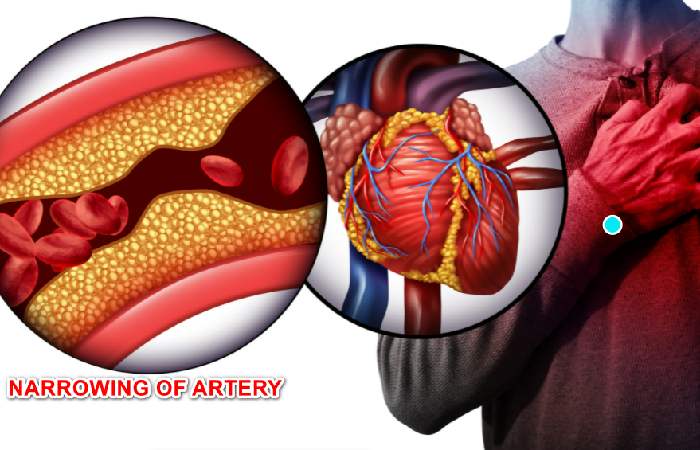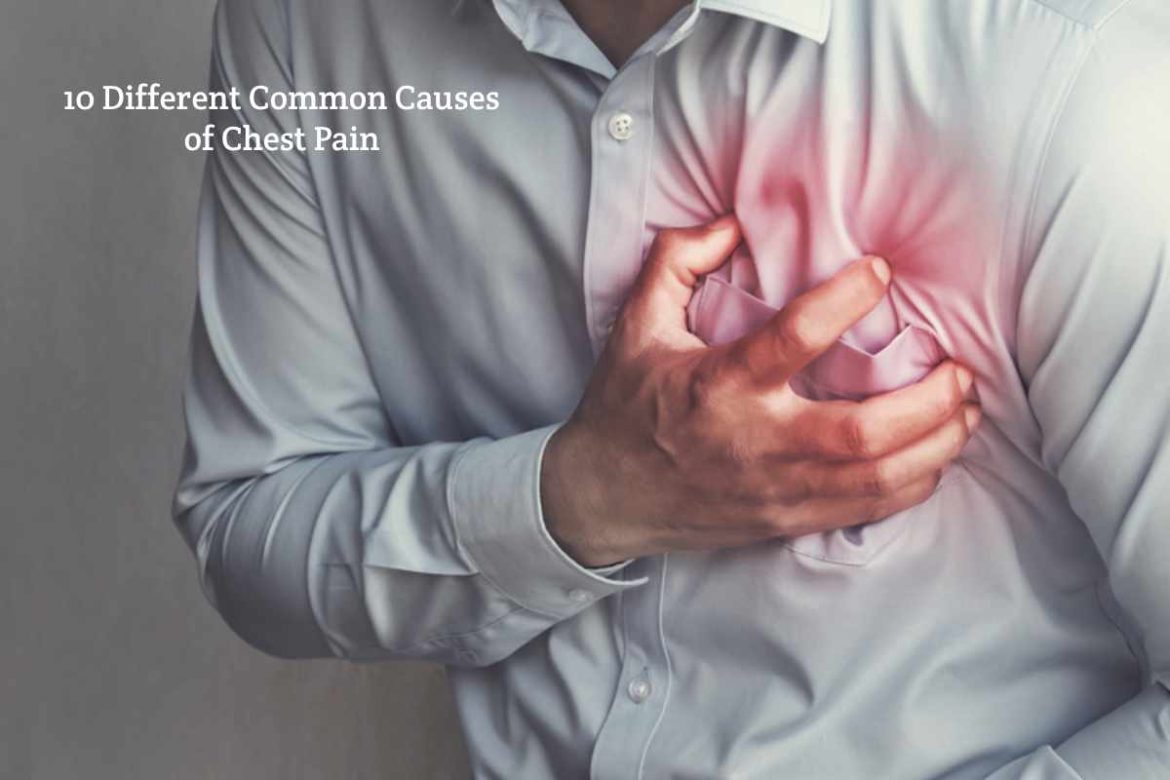10 Different Common Causes of Chest Pain – Whenever we experience chest pain, we often face a large amount of fear. Chest pains are, in our minds, the most common symptom of heart problems. Once chest pain strikes, our initial thought is often “heart attack.” This is, however, not necessarily the case each and every time. Below we’ll discuss the serious as well as the not-so-serious causes of chest pain.
Did You Know?
Chest pain is hardly ever taken lightly. Chest pains are the second largest reason for room visits in the United States, leading to more than 8 million emergency room visits a year. If we take the statistics worldwide, chest pain affects 20 to 40 percent of the general population.
Common Causes of Chest Pain
Muscle Strain
When the muscles and tendons around the ribs become inflamed, it can result in persistent chest pain. The pain that accompanies muscle strain often worsens with exercise. Treatments for muscle strain generally include pain relievers, ice, or splinting, depending on the area.
Peptic Ulcers
Some individuals suffer from sores in the stomach lining as well as the upper portion of their small intestine, known as Peptic Ulcers. These Ulcers do not generally cause intense pain. They can, however, result in a recurring discomfort within the chest area. In order to relieve the pain caused by Peptic ulcers, individuals may take over-the-counter antacids. Antacids are known to ease pain and discomfort caused by Peptic Ulcers. These ulcers occur when stomach acid damages the lining of the digestive tract. Treatment for Peptic ulcers includes medications that decrease stomach acid production. In the event that the ulcers may have been caused by bacteria, antibiotics may be prescribed.
Gastroesophageal Reflux Disease (GERD)
Gastroesophageal reflux disease refers to when the contents of an individual’s stomach begin to move back up into the throat. This is a highly unpleasant sensation and often causes a burning feeling along with a sour taste in the person’s mouth. Gastroesophageal Reflux Disease (GERD) is a chronic disease with symptoms that include burning pain in the chest that occurs most often after eating and worsens when lying down. There are four stages of Gastroesophageal Reflux Disease. Each stage requires the attention of a doctor as well as treatment to help manage it.
Asthma
Asthma is a very common breathing disorder often characterised by inflammation in the airways. The inflammation is known to cause chest pain as well as shortness of breath, coughing, and wheezing. Although asthma is fairly common, it should still be taken seriously. Asthma may be minor, or it can significantly affect daily life and activities. It is possible for asthma attacks to become life-threatening. Various inhalers and oral steroids have been proven to reduce the risk of life-threatening asthma attacks.
Collapsed Lung
Whenever there is air build-up between the lungs and the ribs, it is possible for a lung to collapse. This will cause sudden chest pain when breathing. When an individual has a collapsed lung, they will also experience symptoms such as shortness of breath, tiredness as well as a rapid heart rate. The medical term for a collapsed lung is pneumothorax. When a lung collapses due to the excessive air build-up, a needle or tube is often used to remove the excess air.
Costochondritis
When the rib cage cartilage becomes inflamed, it is known as Costochondritis. This condition is known to cause chest pain. It often develops due to trauma or muscle strain. However, the cause is usually unknown. The pain caused by Costochondritis often worsens with deep breaths or coughing. The pain may also become worse when an individual with Costochondritis sits or lays in certain positions or when they attempt to do any physical activity.
Hiatal Hernia
When a part of the stomach pushes into the chest, it is known as a Hiatal Hernia. This is one of the most common types of hernia that often doesn’t cause any symptoms. It can, however, cause symptoms of GERD when the top part of the stomach pushes down into the lower part of the chest after eating. The symptoms of GERD are often nothing more than chest pain and heartburn.
Hypertrophic Cardiomyopathy
Genetic factors often cause an individual’s heart to grow too thick. This is formally known as Hypertrophic Cardiomyopathy. When the heart grows too thick, it prevents blood from flowing from the heart properly. This will cause the muscle to work very hard to pump the blood. The common symptoms of Hypertrophic Cardiomyopathy are chest pain, shortness of breath, dizziness, lightheadedness, and fainting. Treatment of Hypertrophic Cardiomyopathy may include surgery, an implantable device, or a medication that will slow or regulate the heart rate.
Panic Attack
Panic attacks have been known to cause extreme chest pain. There are various reasons as to why someone would suffer from panic attacks. The attacks don’t usually last long but have been said to cause similar chest pains as a heart attack. When an individual has a panic attack, they need to do their best to remain calm until the panic attack passes. Individuals are suffering from anxiety and stress or at a higher risk of having panic attacks.
Pulmonary Embolism

When you have a blood clot that gets trapped in an artery that feeds blood to the lungs, which is also known as a Pulmonary embolism. Pulmonary embolisms are known for causing chest pain, difficulty breathing, as well as coughing up blood. If a Pulmonary embolism is left untreated, it can be fatal. Blood clots often start in the legs and work their way up through the right side of the heart and into the lungs. When treated fast, the blood clot gets broken down and reduces the risk of death.
When to See a Doctor
Making your way to a doctor is always the best option if chest pain occurs suddenly, especially if anti-inflammatory medications have been taken and symptoms have not eased. If an individual has difficulty breathing along with chest pain, it is important to go to the nearest emergency room or call for emergency medical help.
Symptoms that may require emergency medical help include:
- A crushing feeling or sensation on the breastbone.
- Chest pains that spread to the jaw, left arm, or back.
- Confusion, increased heart rate, or rapid or difficulty breathing.
In cases where chest pain feels severe, heart attacks are still the less likely cause. It is, however, not impossible, and chest pain should be handled with such severity. Statistics show that more than 1 million individuals have heart attacks each year in the United States. Therefore it will be best for you to seek immediate medical attention if an individual is unsure of the source of their chest pain.
In a Nutshell
Heart attacks are often the less likely source of chest pain. However, heart attacks may still occur in individuals of any age or individuals suffering from stress or heart-related conditions. If chest pain arises, an anti-inflammatory medication may help ease the symptoms. In the event that the medication does not work, it is best to seek immediate medical assistance. The cause of chest pain is often not serious and can be treated immediately. If chest pain is accompanied by other odd symptoms such as difficulty breathing or an increased heart rate, taking a trip to the nearest emergency room is your safest option.


